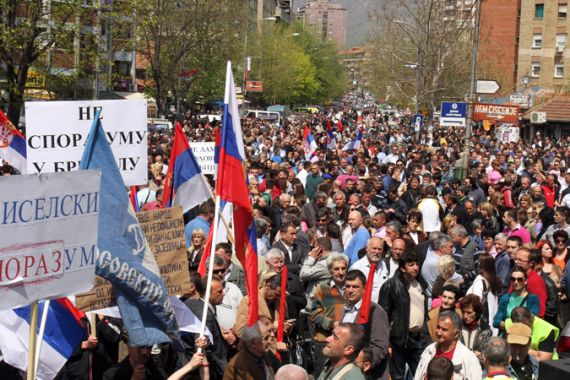Serbians protest Kosovo deal
Historic agreement will normalise tension between Balkan rivals, but has angered Kosovo Serbs who oppose EU integration.

Thousands of demonstrators have marched against the Serbian government to protest against an agreement to normalise relations with breakaway Kosovo.
Flag-waving Serbs chanted “Treason, Treason”, as they gathered in the capital Belgrade hours after the government unanimously approved on Monday the European Union-brokered deal, Al Jazeera’s Aljosa Milenkovic, reporting from Belgrade, said.
Our correspondent said many of the protesters saw the agreement, which reportedly would give away 12 percent of Serbian territory to Kosovo, as a “betrayal” on Serbia, and they want it withdrawn.
Up to 10,000 more Serb protesters also gathered in the divided northern Kosovo town of Mitrovica against the deal that could end years of tensions, and put the Balkan rivals on a path to EU membership.
This agreement is a huge step forward. It can mark a historic turning point for the two countries, but also for the entire region if it is implemented.
The prime ministers of Serbia and Kosovo reached a tentative deal in Brussels on Friday that would give Kosovo’s ethnic Albanian leadership authority over rebel Kosovo Serbs. In return, the minority Serbs would get wide autonomy within Kosovo.
It also calls for the two sides not to obstruct one another as they seek eventual membership in the EU.
After Serbia’s approval, the EU’s executive Commission recommended on Monday that the bloc start membership negotiations with Belgrade.
The Commission said in a report that “Serbia has taken very significant steps toward visible and sustainable improvement in relations with Kosovo”.
“This agreement is a huge step forward. It can mark a historic turning point for the two countries, but also for the entire region if it is implemented,” Guido Westerwelle, Germany’s foreign minister, said at an EU meeting in Luxemburg.
Ban Ki-moon, UN Secretary-General, said he wanted to “congratulate and commend” both sides for their “steadfast determination” and hoped the deal would “bring about a brighter future and lasting stability to the region.”
Almost 100 countries — including the United States and 22 of the 27 EU countries — have recognised Kosovo which unilaterally declared independence in 2008.
‘Cradle of Serbia’
On Sunday, in the Kosovo capital Pristina, the parliament also voted in favour of a resolution to support the agreement.
But it is not clear how the deal will be implemented on the ground in northern Kosovo, where hardline Serb leaders vehemently reject any authority coming from Kosovo’s ethnic Albanians, and consider the region a part of Serbia.
Kosovo is considered by nationalists to be the medieval cradle of the Serbian state and religion.
|
|
| Serbia deal with Kosovo stirs ups old grudges. |
Serbia has also vowed never to recognise Kosovo’s independence, and Serbian officials insist that the latest agreement does not mean Belgrade has de-facto recognised Kosovo’s statehood.
The influential Serbian Orthodox Church also denounced the deal on Monday as a “clear surrender” of “our most important territory,” and urged the country’s legislators to reject it.
The church said in a statement that the deal amounts to “indirect and silent, but still de-facto recognition” of the Kosovo state.
Serbia relinquished control of most of Kosovo in 1999 when NATO chased its troops out of the region after a three-month bombing campaign.
Ending the partition of Kosovo between the Albanian majority and the Serb-controlled north, about a fifth of the country, is a key condition of Serbia’s further progress toward EU membership.